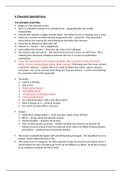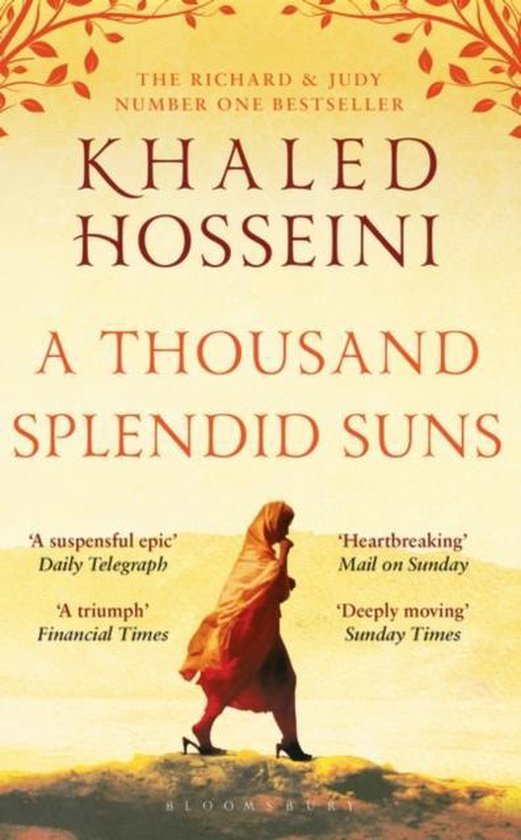A Thousand Splendid Suns
THE OPENING CHAPTERS:
Begins in 1964 (Mariam is five)
Set in a rural place instead of an urbanized city – geographically and socially
marginalized.
Mariam lives outside a village, outside Herat – the Kolba (a hut in a clearing, near a river)
Nana was a servant and then became pregnant by Jalil – ostracism = they have been
ostracized by the community and banished to the Kolba (hut) because:
a) Nana had an adulterous affair with Jalil
b) Mariam is a ‘harami’ – she is illegitimate
c) Nana suffers fits/seizures – when the ‘jinn enters her (epilepsy)
The woman takes the blame – Jalil claims he was forced to have sex with Nana. This is
unlikely given the power imbalance between the two, it is more an exploitative
relationship.
‘Learn this now and learn this well my daughter. Like a compass needle that points
North, a man’s accusing finger always finds a woman.’ This hangs over the novel, women
must learn ‘tahamul’ – endure. We’re in a kind of ‘blame the victim’ culture. Women
lack power and can be coerced to do things but they are blamed – not the man (blaming
the powerless and not the powerful).
The Kolba:
a hut in a clearing
near a river
‘bright yellow flowers’
‘trout-filled stream’
‘circular grove of weeping willows’
‘cottonwoods soared’
it’s a ‘feminine space’ (Jalil’s sons don’t enter)
there is beauty to it – a kind of security
It is a kind of prison AND a sanctuary
Visitors:
Habib Khan (village leader) – small, bearded, tubby, drops off food
Bibi Jo – brings candy and quinces, gossips
Mullah Faizullah – teachers her prayers
They are kind, gentle, generous – Mullah Faizullah asks Nana for permission for
Mariam to go to school to learn to read and write. Nana is terrified of losing Mariam
and refuses – maternal love has become twisted.
The novel is symbolically begins with something being damaged – the beautiful tea set is
broken, which represents Nana’s life.
Jalil clearly loves his daughter: he visits regularly, brings her presents and always wears a
suit but these are ways of making up to her for his failings as a father. He prefers to keep
us at a distance to please his three wives.
,Mullah Faizullah:
Gently progressive man – wants Mariam to get an education
Father figure
‘Islam at its most benign, tolerant, graceful, generous’ he sees the Koran as a work of
exquisite beauty and spiritual sustenance
Contrast with the Taliban who use the Koran as a way of forcing women into submission
– a set of rules, commands and prohibitions
Doesn’t blame Mariam for her mother’s death – his version of Islam is forgiving
Niloufar:
Not yet conditioned into seeing the world through adult eyes
She’s innocent
She accepts Mariam
News of her marriage:
In chapter 7, Mariam sees Jalil’s true self – she tells him he is ashamed of her. The social
stigma of being harami
Mariam is presented with a ‘Fait acompli’
Rasheed is 45, Mariam is 15
She sees sex as a ‘chore’ like cooking and washing her desire and her sexuality is
irrelevant
Flawed fathers:
Both Mariam and Tess are being used by their families
What techniques does Hosseini use to create dramatic intensity?
The sugared almonds ‘clink’ in the bowl we sense his physical weight and power like a
giant
Rasheed’s face her impression rather simple-minded, selfish, cunning man, bestial
sly cheerfulness
crowded teeth
low hairline
bloodshot, watery eyes
fingernails the colour of rotting apples image of decay
his face is a guide to his inner moral nature unsavoury
Hosseini intensifies the narrative perspective – we are in her head she can’t see so
relies on sounds, smells and movement
Her senses are heightened and accentuated
When she signs her name foreshadowing prolepsis 27 years later
Rasheed’s House:
• ‘Dying sapling’ – symbolism of trees Mariam cannot thrive in the barren landscape
subtle foreshadowing
• ‘Unlocked the door’ – he holds the key to her prison incidental details
• Tuberoses on the windowsill remind her of Jalil
• ‘You can thank me then’ – training her like a dog
• Rasheed finds interest in her fear
,• She is alone and doesn’t want to leave her room
• Masculine sphere (more public, social, work) vs feminine sphere (domestic)
• Division between the men and women – and we see Marian explore her ‘world’ (the
house)
• Backdrop of world affairs
• Meets Fariba for the first time sees the female friendships she had never been
around so many people before and has a panic attack
• Rasheed compliments her cooking and she truly is proud he is an arbiter – ‘a flare of
pride’
• Rasheed has respect for the traditional values that have lived in Kabul he thinks low
of Hakin for letting his wife be free (Western culture that is creeping into women’s’ lives)
• ‘A woman’s face is her husband’s business only’
Chapter 1:
• Mariam remembers the first time she heard the word ‘harami’ or bastard – she is five
years old and her father comes to visit her and Nana the theme of shame envelops
Mariam’s story the word
• Mariam breaks a piece of Nana’s treasured tea set so Nana calls her a clumsy harami –
only later does Mariam understand the shame associated with the word, staking her out
as an unwanted person who will never find love Mariam will always occupy the
lowest rung on the social ladder in Afghanistan
• Mariam adores Jalil, who never called her such a name, but instead visits and tells her
stories about their city, Herat, and the famous poet Jami who lived there Mariam
believes his stories because she’s never been to the city but Nana says that Jalil spins lies
and has betrayed them by casting them out
• It is easier to love Jalil than Mariam’s bitter and beleaguered mother
• Jalil has three wives and nine legitimate children, owns a cinema and is very wealthy
• Nana was one of his housekeepers but then became pregnant with Mariam, her father
disowned her and Jalil sent her off to live in the kolba – Mariam is reminded to never
trust men as a man will always find a way to accuse a woman
Chapter 2:
• Nana explained to Mariam that she refused to live in Herat, where the neighbours would
whisper about her – instead she moved to a clearing on the edge of the village Gul
Daman on the outskirts of Herat ambiguity between Jalil sending Nana off because of
shame, and Nana choosing to live in isolation because of her pride
• Nana had been engaged once before to a parakeet seller but a week before the
wedding, a jinn entered Nana’s body (really a seizure) and the family called off a
wedding Nana is no stranger to suffering though we gain a sense that hope was once
available to her
• Nana says that when she gave birth to Mariam in spring 1959, Jalil didn’t bother to call a
doctor – she describes her pain to Mariam, who apologises
• However when Mariam is a little older, she begins to believe Jalil who says he did send
Nana to hospital – Nana fumes at this version of the story countering that Jalil was away
, horseback riding and didn’t care she constantly has to assess the truthfulness of the
different versions of the stories she hears
• Nana and Jalil also each claim to have chosen Mariam’s name, though Mariam believes
Jalil she always takes Jalil’s side showing her unceasing loyalty to her father and her
inability to see past pure love to the messier social relations behind it
Chapter 3:
• Every so often, Jalil’s two sons push a wheelbarrow filled with food and cooking supplies
up the hill to the kolba – Nana always greets them with her arms crossed and a defiant
posture, cursing their mothers and making faces at them the brothers offer Mariam a
glimpse into the life that she could have if she were to be fully accepted as one of Jalil’s
true children
• Mariam feels sorry for them, once she yells an insult at them to please Nana but she
always waits in hiding to watch them leave
• Nana teaches Mariam to cook and sew – she only admits a few visitors: the village leader
Habib Khan, her old friend Bibi jo, and Mullah Faizullah, the elderly Koran teacher
• Habib Khan – village leader, small, bearded, tubby, drops off food
• Bibi jo – brings candy and quinces, gossips
• Mullah Faizullah – teachers her prayers
• Mullah Faizullah tutors Mariam in prayer and recitation and teachers her to read – they
go on walks where he tells her about his travels, he tells her that she can use the Koran
for comfort when she needs it Mullah Faizullah will remain one of the most
significant figures in Mariam’s life, a source of spiritual guidance and wisdowm that she
will rely upon in her most difficult times he also gives her a glimpse into the world
beyond the kolba and the village
• One day Mariam mentions that she would like to go to school, Mullah Faizullah asks
Nana for permission for Mariam to go to school to learn to read and write Nana is
terrified of losing Mariam and refuses – her maternal love has become twisted at a
historical moment when education is available only wealthy girls can get an education
Chapter 4:
• Though Mariam loves having visitors, she treasures Jalil’s visits each Thursday the most –
each week she awaits him anxiously though she tries not to seem too excited for Nana’s
sake
• Nana is always calmer and more-polite in Jalil’s presence, washing her hair, putting on a
nice hijab and serving him and Mariam tea he clearly exerts a kind of power over her
• Jalil shows Mariam how to fish, teaches her rhymes, shows her clipping from Herat’s
newspaper – a piece of world outside the kolba
• In the summer of 1973, when Mariam is 14, Jalil tells her that the king has been deposed
in a bloodless coup and that Afghanistan has become a republic along with Mullah
Faizullah, Jalil serves as Mariam’s link to the broader world
• Jalil gives Mariam a leaf-shaped pendant, Mariam loves it but Nana scoffs and says that
it’s just nomad jewelry made from coins people throw at them Mariam has to choose
between two competing visions of her father – at this moment any gift from her father
only makes her adore him more





